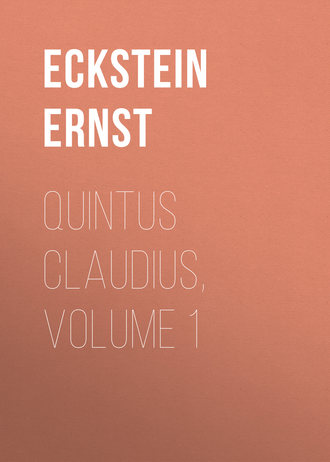
Quintus Claudius, Volume 1
383
My sweet Erotion. A child of this name, who died in early youth, is mentioned by Martial, Ep. V, 34, 37, and X, 61.
Ep. V, 34.
“Ye parents Fronto and Flaccilla here,
To you do I commend my girl, my dear,
Lest pale Erotion tremble at the shades,
And the foul Dog of Hell’s prodigious heads.
Her age fulfilling just six winters was,
Had she but known so many days to pass.
’Mongst you, old patrons, may she sport and play,
And with her lisping tongue my name oft say.
May the smooth turf her soft bones hide, and be
O earth, as light to her, as she to thee!”
Fletcher.
Ep. X, 61.
“Underneath this greedy stone
Lies little sweet Erotion;
Whom the Fates, with hearts as cold,
Nipp’d away at six years old.
Thou, whoever thou mayst be,
That hast this small field after me,
Let the yearly rites be paid
To her little slender shade;
So shall no disease or jar,
Hurt thy house, or chill thy Lar;
But this tomb be here alone
The only melancholy stone.”
Leigh Hunt.
384
Philosopher of Sinope. The well-known Cynic philosopher Diogenes, born at Sinope on the Black Sea, 404. B.C.
385
Faun (from faveo– to be favorable). A god of the fields and woods, akin to the Greek woodland deity, Pan.
386
Dryad. The embodied life-principle of the tree, a tree-nymph.
387
Pannonian lynx. Pannonia, now Hungary. Lynxes were also imported from Gaul.
388
Where you, Caius, are, there will I, Caia, be. An ancient formula, in which the bride vowed faith and obedience to the bridegroom.
389
Zeuxis of Heracleia in Greece, a famous artist, who lived about 397 B.C. His contest with Parrhasius, in which he painted grapes so deceptive, that they lured the birds, is well known.
390
Peripatetics (wanderers.) A name given to Aristotles’ school of philosophers, from its founder’s habit of delivering his lectures, not seated, but walking about.
391
Cabbage Sprouts. In the spring the young cabbage shoots (cimae, prototomi) were eaten, in the summer and autumn the larger stalks (caules cauliculi) see Mart. Ep. V. 78.
392
Cybium (κύβιον). A sort of mayonnaise made of salt tunny-fish, cut into squares. See Mart. Ep. V. 78, where the sliced eggs are not lacking. There were two kinds of leek (porrum:) porrum sectile (chives) and porrum capitatum.

